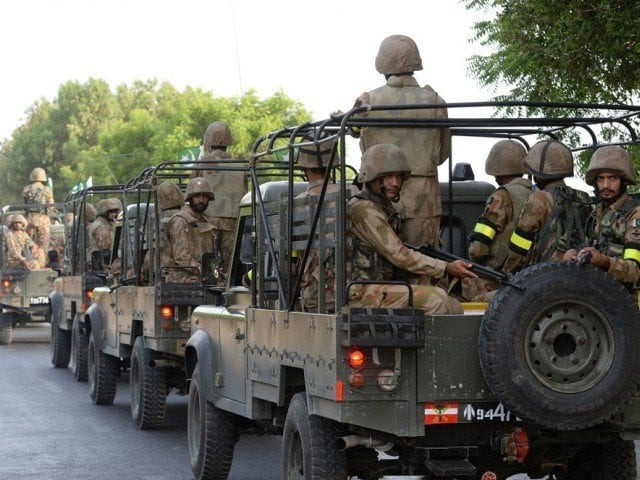Army budget trimmed to pave way for IMF deal
Development programme slashed by Rs72b or one-fifth of allocation made on June 10

Pakistan has slashed the armed forces development programme by Rs72 billion or one-fifth of the allocation made on June 10 in order to meet a major condition of the International Monetary Fund (IMF) about achieving primary budget surplus in the new fiscal year.
Having a primary budget surplus of Rs153 billion or 0.2% of the national output is one of the core conditions of the IMF for the revival of the bailout package. Finance Minister Miftah Ismail now hopes to clinch the staff-level deal before the end of this week.
The original budget that the government tabled in the National Assembly on June 10 showed Rs363 billion allocations for the armed forces development programme. However, the budget provision has been reduced to Rs291 billion, according to the revised budget that the Ministry of Finance made public after its approval from the National Assembly.
It has cut the armed forces development programme by Rs72 billion or nearly 20%. The allocations are in addition to the regular defence budget. It is the second time in as many years that the armed forces development programme has been slashed due to fiscal constraints and limitations imposed by the IMF.
For the last fiscal year, the previous government had allocated Rs340 billion for this purpose but the actual spending has been shown at Rs270 billion, according to the budget books. Last year, The Express Tribune had reported that the then government decided to reduce allocations for the military’s contingency obligations.
When contacted, an official of the Ministry of Finance said that the armed forces development programme had to be reduced to bring down overall expenditures in a shape where the primary budget surplus target of the IMF could be achieved.
The government has set the primary budget surplus target at Rs153 billion or 0.2% of GDP on back of Rs750 billion provincial cash surpluses. However, the provincial budgets do not reflect the Rs750 billion savings and the IMF asked the government to secure the provincial endorsements through memorandum of understandings (MoUs).
READ Rupee dips to 207 against USD amid rumours of IMF deal postponement
The Khyber-Pakhtunkhwa government has linked the signing of the MoU with the federal government’s ability to provide requisite funds to meet the needs of the erstwhile Federally Administered Tribal Areas (FATA). These areas have been merged with the K-P province.
K-P’s Finance Minister Taimur Saleem Jhagra met with Ismail to find an amicable way out. “Our objective is not to be obstructive to signing of the MoU and the provincial cabinet has already given authority to the chief minister,” Jhagra said while talking to The Express Tribune.
The provincial finance minister said that, however, it was important that the issues raised in a letter sent to the finance ministry are resolved and a positive step was taken on Tuesday during a meeting with the federal finance minister.
Although all the four provinces seem committed to signing of the MoUs, none has effectively shown provincial budget surpluses. The Punjab government that had earlier given a surplus budget on Monday announced over Rs100 billion electricity subsidies. This has eroded any surplus left besides exposing other provinces to similar demands from their poor people.
In an interview to a private TV channel, Ismail said that the government on Tuesday gave a “comprehensive reply to the IMF on the draft Memorandum for Economic and Financial Policies and a staff level agreement can be reached within two to eight days”.
The IMF had shared the MEFP last Monday and then Ismail had promised to sign the deal within one week but he could not close the gaps. Ismail has also briefed the military leadership about prospects of the IMF deals, telling it that the agreement could be reached by Thursday, according to the sources.
After staff level agreement, Pakistan will have to implement all the conditions agreed with the IMF before the executive board of the global lender approves the loan tranche and declares completion of the 7th and the 8th reviews of the bailout programme.
To satisfy the IMF, the government made adjustments in other expenditures with the total size of the budget now being Rs9.6 trillion –higher than proposed on June 10. The stated defence budget has been further increased to Rs1.567 trillion – an increase of 14.1% or Rs194 billion over the last year’s original allocation. Compared with June 10, the defence budget has been increased by another Rs41 billion.
The cost of civilian and military pensions has been increased to Rs609 billion – up from Rs530 billion three weeks ago. A major condition that still remains outstanding is notifying the Rs3.51 per unit increase in electricity prices from July 1. The government will also have to hand over the cabinet’s decision to further impose Rs10 per litre levy on petrol from August 1 to the IMF.
Ismail said he had secured the PM’s approvals on Tuesday for all necessary actions. The IMF has also set the condition that Pakistan should review its anti-corruption laws. The condition has been imposed after the recent amendments to the accountability law that unsettled the global lender.
Ismail said the IMF had asked for a diagnosis of the corruption laws in consultation with the international experts.



















COMMENTS
Comments are moderated and generally will be posted if they are on-topic and not abusive.
For more information, please see our Comments FAQ